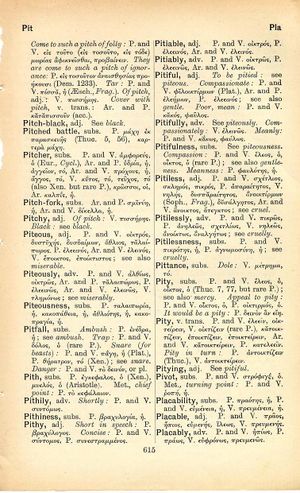pity
καὶ ἄλλως δὲ πολυειδῶς συζευγνύουσι τοῖς πράγµασι τὰ µαθήµατα, ὡς καὶ τῶν πραγµάτων ὁµοιοῦσθαι τοῖς µαθήµασι δυναµένων καὶ τῶν µαθηµάτων τοῖς πράγµασι φύσιν ἐχόντων ἀπεικάζεσθαι καὶ ἀµφοτέρων πρὸς ἄλληλα ἀνθοµοιουµένων → they couple mathematical objects to things in several other ways as well, since things can be assimilated to mathematical objects, and mathematical objects can by nature be likened to things, both being in a relation of mutual resemblance
English > Greek (Woodhouse)
subs.
P. and V. ἔλεος, ὁ, οἶκτος, ὁ (Thuc. 7, 77, but rare P.); see also mercy. Appeal to pity: P. and V. οἶκτος, ὁ, P. οἰκτιρμός, ὁ. It would be a pity: P. δεινὸν ἂν εἴη. v. trans. P. and V. ἐλεεῖν, οἰκτείρειν, V. οἰκτίζειν (rare P.), κατοικτίζειν, ἐποικτίζειν, ἐποικτείρειν, Ar. and V. κατοικτείρειν, P. κατελεεῖν. Pity in turn: P. ἀντοικτίζειν (Thuc.), V. ἀντοικτείρειν.

